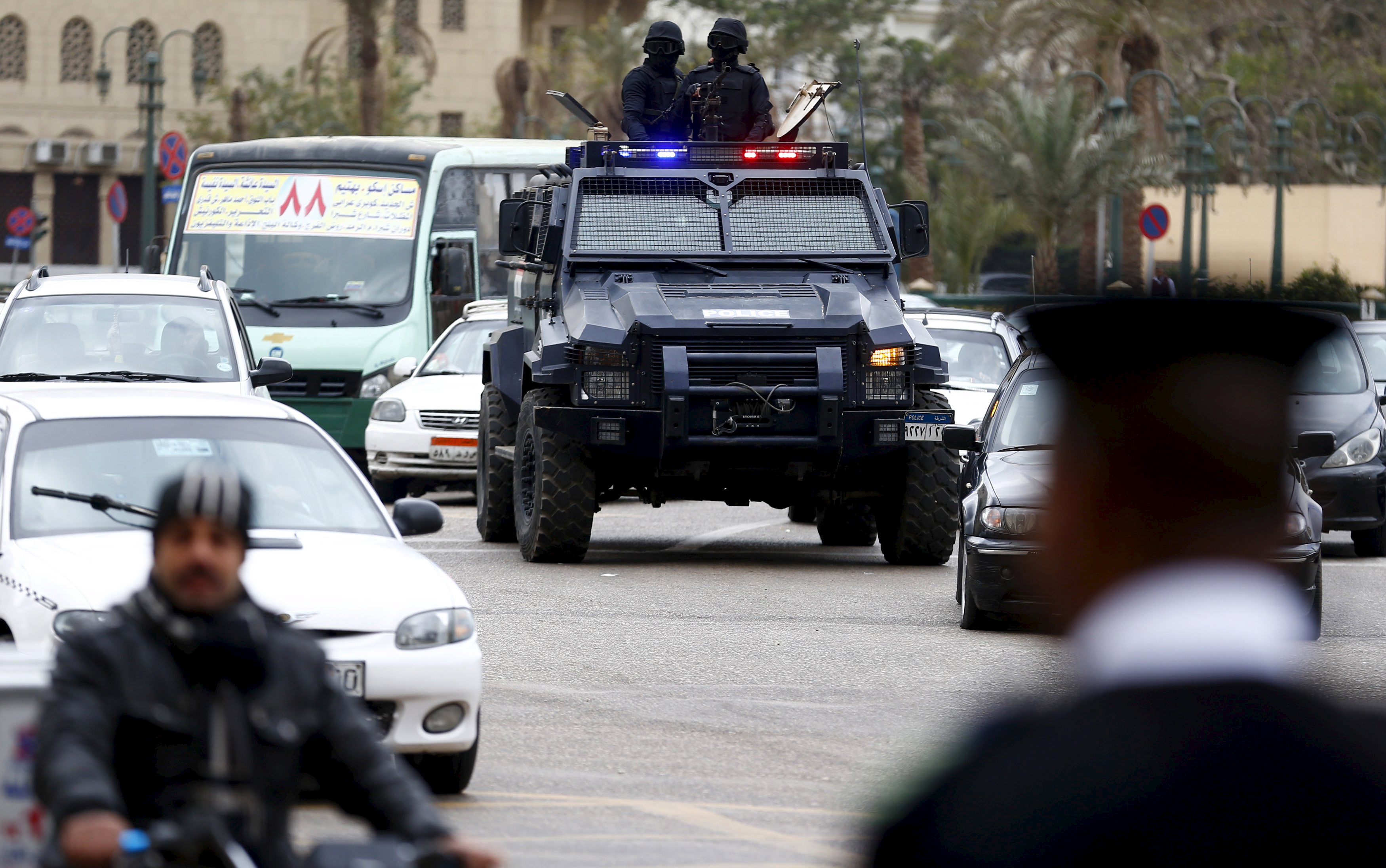Latest NEWS
- Aswat Masriya, the last word
- Roundup of Egypt's press headlines on March 15, 2017
- Roundup of Egypt's press headlines on March 14, 2017
- Former Egyptian President Hosni Mubarak to be released: lawyer
- Roundup of Egypt's press headlines on March 13, 2017
- Egypt's capital set to grow by half a million in 2017
- Egypt's wheat reserves to double with start of harvest -supply min
- Roundup of Egypt's press headlines on March 12, 2017
Five years after 2011 Uprising: Polishing policemen's shoes for free in Tahrir Square

CAIRO, Jan 25 (Aswat Masriya) - Ahmed spends his day sitting in Tahrir Square, beating his wooden box from time to time to attract customers. He polishes shoes in return for a few Egyptian pounds. Some do not need to hear his beats to come and have their shoes polished: Police personnel on Tahrir Square are regular customers who never pay Ahmed, simply because they are from the police.
Tahrir Square, which lies in the heart of Cairo, is the iconic square where Egyptians took to the streets five years ago to topple then-president Hosni Mubarak who ruled the country for around 30 years.
Five years after the 2011 Uprising, during which police officers retreated from the streets as protests gained momentum, the interior ministry is now back in full swing. Human rights defendants’ concerns about violations by police personnel have also surged.
In an attempt to improve their image, police officers offered flowers to passersby in the square on the eve of the uprising's anniversary.
Jan. 25 also marks the 64th national police day.
On Jan. 24, Ahmed, who asked that his real name be withheld, was polishing the shoes of one policeman in silence, trying hard to be nice and friendly even though he knows the “customer” will eventually walk away without paying a penny.
“If I ask him to pay me, he will take the whole box and arrest me,” said the 35-year-old father of two.
Aswat Masriya documented on film the testimonies of vendors complaining about police personnel’s treatment.
Streams of traffic flowed past the square amid a large police presence.
Tens of people gathered where the protesters’ famous Tahrir Square platform used to exist in 2011. On the platform, leading protesters used to give speeches that often mobilised others against what was viewed as violations by the police and army. Today, the same spot is witnessing the chanting of songs and slogans in support of the very two apparatuses.
Ahmed points to the square and speaks, his fingers stained with shoe polish. He says police expanded their presence ahead of the anniversary.
Police practices have worsened in the past five years, he adds.
A Ministry of Interior source told Aswsat Masriya that police personnel do not receive services free of charge, adding that if any such incident takes place, it is an isolated incident.
Unless such incidents are reported to the police, the ministry cannot deal with them or punish wrongdoers, he said.
The Ministry of Interior source also said that street vendors are not legally allowed to be present in downtown Cairo, where Tahrir Square is located, and the authorities have specified for them alternative places to operate at.
In the weeks that preceded the uprising’s fifth anniversary, the police conducted mass searches of flats in downtown Cairo, raided cafes and cultural centres, urged cafe owners to install surveillance cameras, and arrested activists.
A report released by a local NGO in January demonstrates that Ahmed has reason to be concerned about police practices.
The report, issued by El Nadim Center for the Management and Rehabilitation of the Victims of Violence, details a number of cases in which police personnel are accused of committing violations in 2015. It mentions cases of death in custody, torture, “enforced disappearance” and medical negligence.
According to Nadim Centre’s report, 474 were killed by security forces in 2015, including 137 who died in custody.
Some died after having altercations with security personnel, run over by security vehicles, or shot during protests, according to the report.
Last year saw 700 cases of torture and ill-treatment, including 267 in police station, 241 in prisons, and 97 in Homeland Security centres, the report added.
Ahmed makes EGP 60 (around $7.66) a day and around EGP 1500 a month (around $191.51). He pays half of his monthly income for a small flat where he lives with his wife and children.
“Bread, freedom and social justice” was the slogan chanted in Tahrir Square in 2011, but Ahmed does not want another uprising to take place. He fears that another uprising would only cause an even severer security crackdown.
Nadim Centre’s annual report also mentions 464 “enforced disappearances” in which citizens were arrested by personnel in plainclothes and in uniform without arrest warrants. The cases mentioned in the report include 139 who were arrested at their homes and 25 at their workplaces, with the rest arrested on streets, underground train stations, and airports.
The Ministry of Interior source told Aswat Masriya that the ministry is looking into all complaints and reports issued by human rights organisations about torture cases, deaths in custody and enforced disappearances.
He added that suspects’ families are trying to create chaos on the anniversary of the Jan. 25 uprising.
He ruled out that the number of violations could be as high as mentioned in Nadim Centre’s report, adding that the National Centre for Human Rights referred 191 complaints to the interior ministry recently and received responses on 118 cases.
The ministry is currently looking into the findings of Nadim’s report, he added.
Ahmed, the shoeshine man, looks confused when he hears about enforced disappearances. “I want them to let me work or to provide me with a job, and if I make a mistake, they can punish me,” he said as he continued to beat his wooden box.










